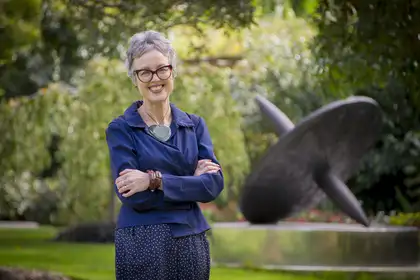
Professor Giselle Byrnes
‘As appropriate for a university, Massey has not taken a single position on this issue’. This phrase, an ironic recitation of the university's own statement on why it was not making comment on the war in Gaza, appeared last week boldly emblazoned in red, black, green and white paint on the walls of a stairwell in the Fine Arts building on Te Kunenga ki Pūrehuroa Massey University’s Wellington campus. It was part of a student protest against the university’s perceived inaction in not publicly supporting the Palestinian cause.
Do universities have a right to remain silent? Or should they adopt an explicit position commenting on specific events, decisions and, in this case, on a war? Those of us who follow these issues closely will know that the presidents of Harvard University, the University of Pennsylvania and the Massachusetts Institute of Technology, called to testify before the United States’ House Education and Workforce Committee in December last year, refused to provide definitive answers on whether calls by students on their campuses for ‘the genocide of Jews’ violated their respective campus codes of conduct. All three presidents, without responding yes or no, ultimately replied that answers must be ‘context-dependent’ as required by their universities’ speech policies. Technically, they were correct, but in the court of public opinion their responses lacked moral clarity and the presidents of Harvard and Penn duly resigned.
That universities fulfil a critical role in democratic societies is well understood. They provide the conditions where new ideas are explored and old ideas are tested. Central to this is academic freedom, underpinned by the values of intellectual autonomy, freedom of expression, critical inquiry, research integrity, institutional independence, governance and academic decision-making, and upholding ethical standards. These values create an environment where knowledge can be produced without fear or favour, where diversity of thinking is encouraged and where educational and research agendas may be advanced without political interference. In New Zealand, academic freedom is enshrined in section 267 of the Education and Training Act 2020 as ‘the freedom of academic staff and students, within the law, to question and test received wisdom, to put forward new ideas and to state controversial or unpopular opinions’. In short, academic freedom is fundamental to the definition of a modern university.
The role of the university itself in this is clear. It is to facilitate a safe environment for staff and students to express their academic freedom; it is not for the institution to make a specific statement or adopt a singular position on any particular issue.
This is not a sign of weakness, academic equivocation or ‘fence sitting’; rather, it is respecting academic freedom as defined in Aotearoa New Zealand. The Education and Training Act 2020 refers to ‘the freedom of academic staff and students, within the law, to question and test received wisdom, to put forward new ideas, and to state controversial or unpopular opinions’, ‘the freedom of academic staff and students to engage in research’, ‘the freedom of the institution and its staff to regulate the subject matter of courses taught at the institution’, ‘the freedom of the institution and its staff to teach and assess students in the manner that they consider best promotes learning’ and ‘the freedom of the institution through its chief executive to appoint its own staff’. To be clear, individuals may have views, but the institution itself does not have the right to state views; it is the role of the university to create the conditions where staff and students may exercise these rights.
Expecting ‘the university’ to take a singular stance also begs the question: who or what, is ‘the university’? According to my go-to AI search engine, the university ‘represents the collective entity that encompasses the physical campus, academic community, resources, and overall environment dedicated to higher education, research, and the pursuit of knowledge.’ It is generally understood that ‘the university’ typically refers to the institution itself, comprising its physical campuses, academic programmes, all staff and the student body; it does not refer to a discrete unit of the university (the managers, the buildings or what some might call ‘the brand’).
Individuals and groups within a university may express views, but surely it would be impossible for all minds to think alike – an idea which is itself anathema to the diversity of views universities seek to foster.
This does not mean that universities should be blind to their own context and operating environment. At Massey, for instance, our Academic Freedom Policy upholds academic freedom while recognising that freedom comes with responsibilities, including a commitment to encourage respectful dialogue, and that the enactment of academic freedom should not silence, disparage, marginalise, stigmatise or incite hostility towards others – especially vulnerable groups or those that have been marginalised in the past.
‘As appropriate for a university, Massey has not taken a single position on this issue’. Given our legislated definition of academic freedom, it is hard to disagree with this statement. The university supports protest as an expression of free speech and academic freedom and provides the platform for others to speak from an evidence-based position, but it should not condone damage to property or harm to people.
Professor Giselle Byrnes is Provost at Te Kunenga ki Pūrehuroa Massey University.